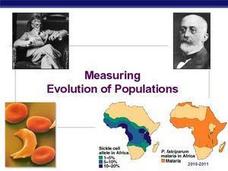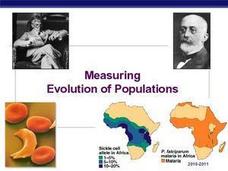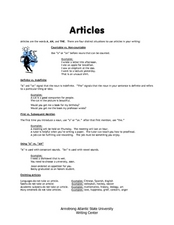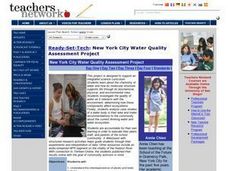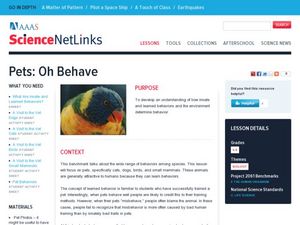Curated OER
How Are the Eyes of Different Organisms Adapted for Sight?
Learners compare/contrast the human eye to two other organisms. They use micro viewers to identify the human eye structures, complete a Venn diagram worksheet, identify the function of each eye structure, and answer discussion questions.
Curated OER
More Basic Biotechnology Tools, Sorting & Copying DNA
You can use these slides to explain the many complicated steps of the Polymerase chain reaction. The diagnostic and forensic uses of gel electrophoresis are detailed. This PowerPoint could be used to communicate facts, and also to prompt...
Curated OER
Introduction to Adaptation
Tenth graders observe collections of specimens and discuss their answers to provided questions. They explore common ancestry, homology, analogy, adaptive radiation, and evolution, while formulating creative answers based on their...
Curated OER
Measuring Evolution of Populations
The Hardy-Weinberg principle is the focus of this concise slideshow. Some vocabulary definitions are given on the first 2 slides, and the rest are given over to examples of the Hardy-Weinberg theorem. Calculations of the H-W principle...
Curated OER
Measuring Evolution of Populations
The five agents of evolutionary change are reviewed in this slideshow. Definitions of common terms involved with populations and equilibrium are given, and there are some presentations of Hardy Weinberg equations for common examples of...
Curated OER
Photosynthesis:The Calvin Cycle
From the light reaction to the Calvin cycle, this presentation contains information about the various stages of photosynthesis. This is a great supplement to some of the biochemistry-heavy presentations about the specific mechanisms....
Berkeley Lab
Virtual Frog Dissection Kit
Fluffy is one of the most common names for a pet frog. Fluffy, the digitized frog in this dissection kit, opens up quite literally to allow scholars to see what's inside. The basic kit encourages pupils to click on various organs to see...
Curated OER
Genetic Disorders
Students examine how living cells create new cells and how genetic mutations can cause disorders and be inherited. In this genetic reproductionn lesson students create their own PowerPoint presentation.
Concord Consortium
Gestation and Longevity
Is the gestation length of an animal a predictor of the average life expectancy of that animal? Learners analyze similar data for more than 50 different animals. They choose a data display and draw conclusions from their graphs.
Curated OER
Spring Fever
Students grow plants from seeds that can later be placed in outdoor settings. They care for the seeds while they germinate and begin to leaf out.
Curated OER
More Basic Biotechnology Tools
You can use these slides to explain the many complicated steps of the Polymerase Chain Reaction. The diagnostic and forensic uses of gel electrophoresis are detailed. This PowerPoint could be used to communicate facts, or to prompt...
Curated OER
Articles and Article Check-Up
Help your learners practice proper article usage with this informational handout and brief exercise. After reading information about articles and their uses, including details about when to omit articles, scholars complete fourteen...
Curated OER
Pets: Oh Behave
They say that a dog is a man's best friend. Why is that? Discuss with your class why people like pets and the responsibilities with owning one. They read an article about pet behavior and write a short essay comparing one of their...
Curated OER
The Human Brain's Capacity for Language
Incorporate this slide show into your lecture about speech, language, psychology, or physiology. Addressing the structure of the brain as well as handedness and aphasia, the presentation could fit the needs of many different lecturers....
Out of Africa Wildlife Park
A Thematic Learning Guide to Lions
Written as an accompaniment to a field trip to the Out of Africa Wildlife Park in Arizona, this is an interdisciplinary, themed instructional activity on lions. Even if you cannot take your upper-elementary kids to this attraction, there...
Curated OER
Kinetics Practice 2-Key
In this kinetics worksheet, students solve seven problems related to chemical reactions and their rates. Students identify rate laws for mechanisms, they draw reaction diagrams, and they determine rate constants.
Curated OER
Pets: Oh Behave
Students develop an understanding of how innate and learned behaviors and the environment determine behavior. They see how a variety of factors affects our pet's behavior-including species-specific traits, the environment, training, and...
Curated OER
Comparing Ovaries And Testes
In this reproductive system worksheet, students compare specimens of rat ovaries and testes. They complete 5 short answer pre-lab questions, follow an 11 step procedure and answer 5 analysis questions.
Curated OER
Boosting Your Memory
In this memory instructional activity, students learn about three different ways to memorize given information. They make up phrases to help remember lists and they create mental maps to remember terms. They put what they learned to the...
Curated OER
The Water Detectives
Pupils collect water samples from designated sampling stations, and discuss water pollution. They analyze the water samples, record the data on a spreadsheet, and present the environmental water quality data to the class.
Curated OER
Where Do I Belong?
Tenth graders study the diversity of life in the world. They classify and sketch organisms into the 6 kingdoms.
Curated OER
Can You Beat Jet Lag?
Learners examine the health condition of jet lag. Using mealworms, they test the effect of light on the development of them into adults. They answer discussion questions and examine the relationship of age and one's activity level.
Curated OER
New York City Water Quality Assessment Project
Young scholars investigate the chemistry of water and how its molecular structure supports life through its biochemcial, physical, and environmental roles. They investigate the quality of water as it interacts with the environment. ...
Curated OER
Pets: Oh Behave
Students develop an understanding of how innate and learned behaviors and the environment determine behavior.





